Job-Oriented DevOps Course with Hands-on Training
DevOps is the hottest topic in the IT sector right now, offering high-paying job opportunities and a well-defined career path. Therefore, enrolling in the DevOps course offered by Rexton IT Solutions is the right career move for candidates aiming for jobs in the IT industry. Moreover, this job-oriented course will not only cover the critical DevOps fundamentals but will also provide you with hands-on experience.
Enroll Now
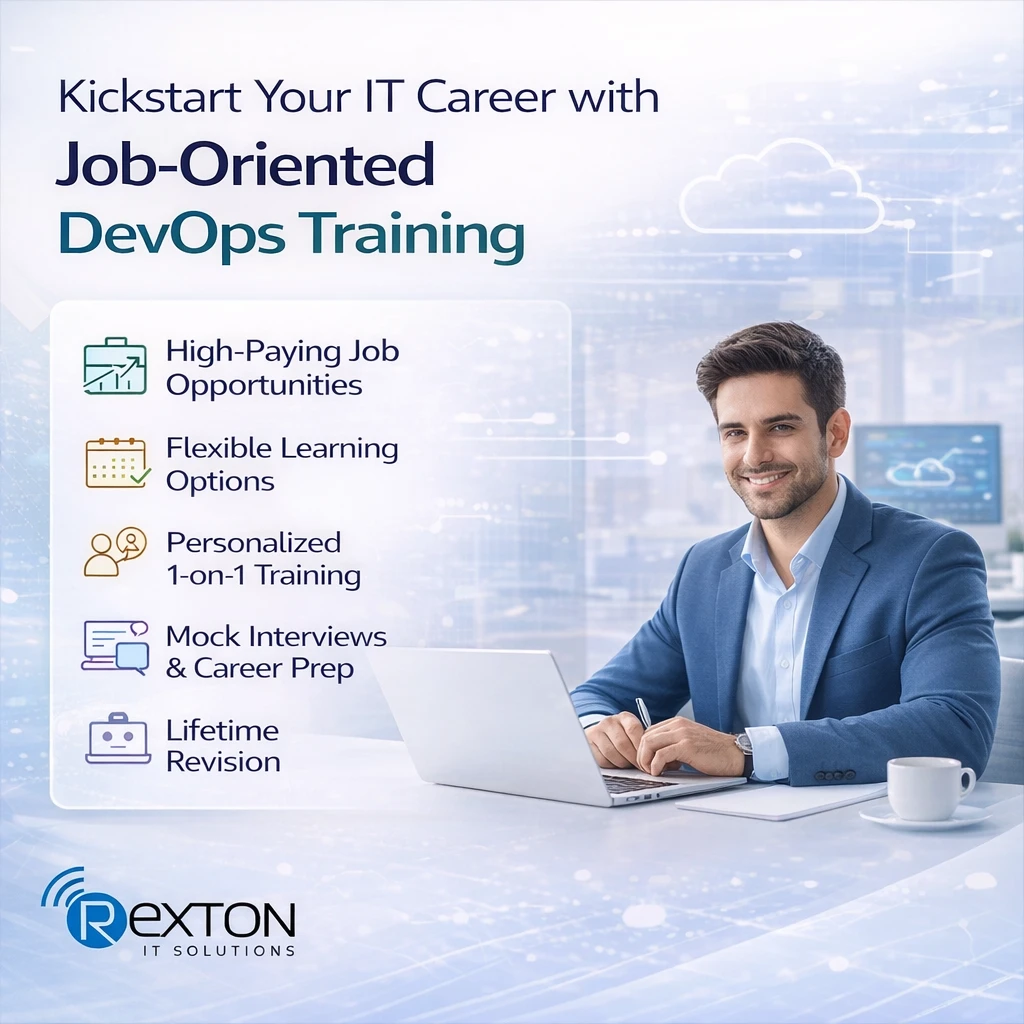
Book A Demo Class
Why is This DevOps Training Course Different?
- Job Opportunities and Placements – Give your career a significant boost
- Online and Offline Classes – Learn at your own pace with flexible lectures
- Personalized Training – Get 1-on-1 doubt-clearing sessions from industry experts
- Job Preparations – Career counselling and mock interviews
- Lifetime Revision – Revisit the course materials, access lectures, and notes for free
- Lab Sessions – Solidify your learning with practical learning
- Online Classes: Access pre-recorded lectures and study resources anytime with our flexible online classes. Ideal for working professionals and students.
- Offline Classes: Attend interactive classes in our offline facilities with advanced lab setups.
- Doubt Clearing Session: Make learning more personalized with our 1-on-1 doubt-clearing sessions.
- Covering the latest curriculum with modern software tools and applications to learn relevant skills.
- Prepare for jobs as well as certification exams with this comprehensive DevOps course.
- Pre-recorded online lectures from industry experts with significant experience.
- Personalized and focused learning with special 1-on-1 training.
- Practical lab sessions for hands-on experience.
- Career guidance from professional DevOps engineers.
Why Choose Rexton IT Solutions for DevOps Training Online
Choosing the DevOps course by Rexton IT Solutions gets you job-ready and also prepares you for certification exams. Whether you are a beginner looking to start a career in DevOps or an IT professional seeking a career change, our comprehensive course is the right choice. Here is why you should choose us:
Training Features
Job-Oriented Learning
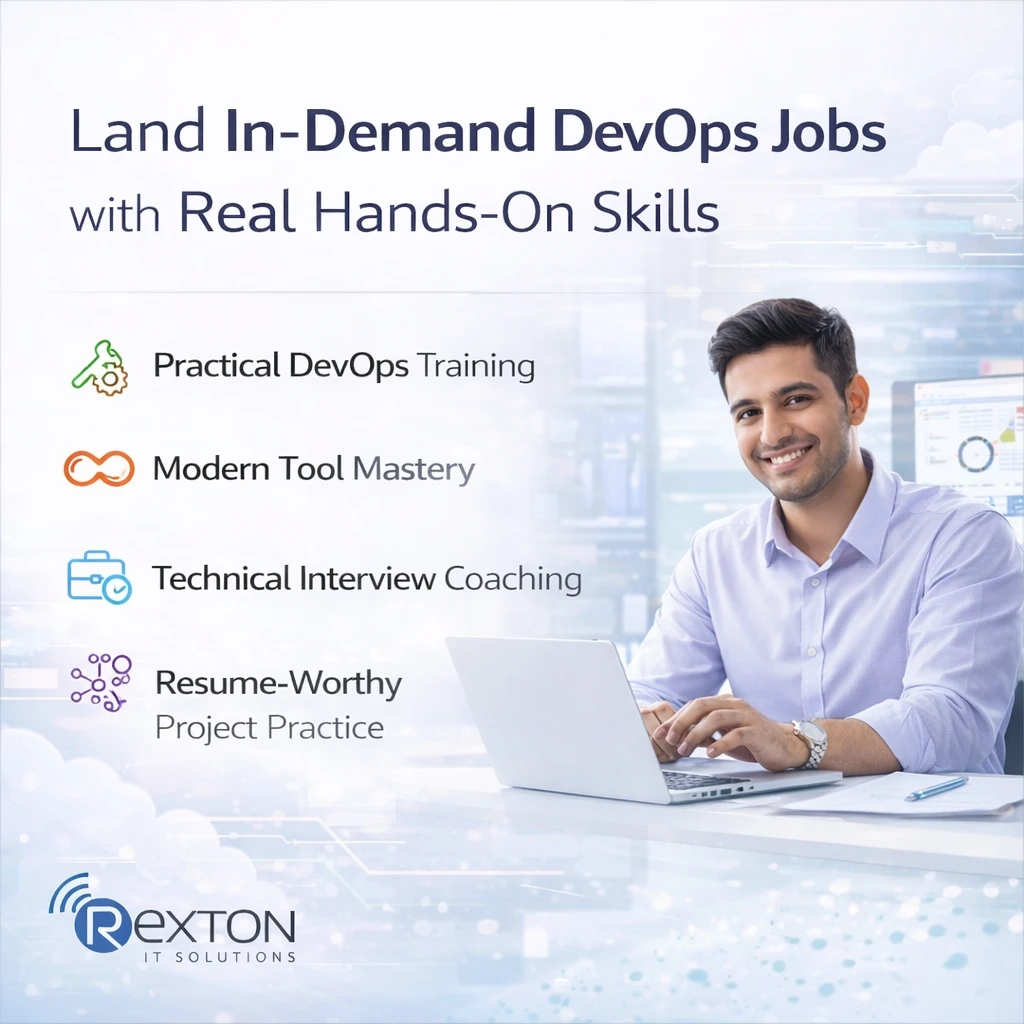
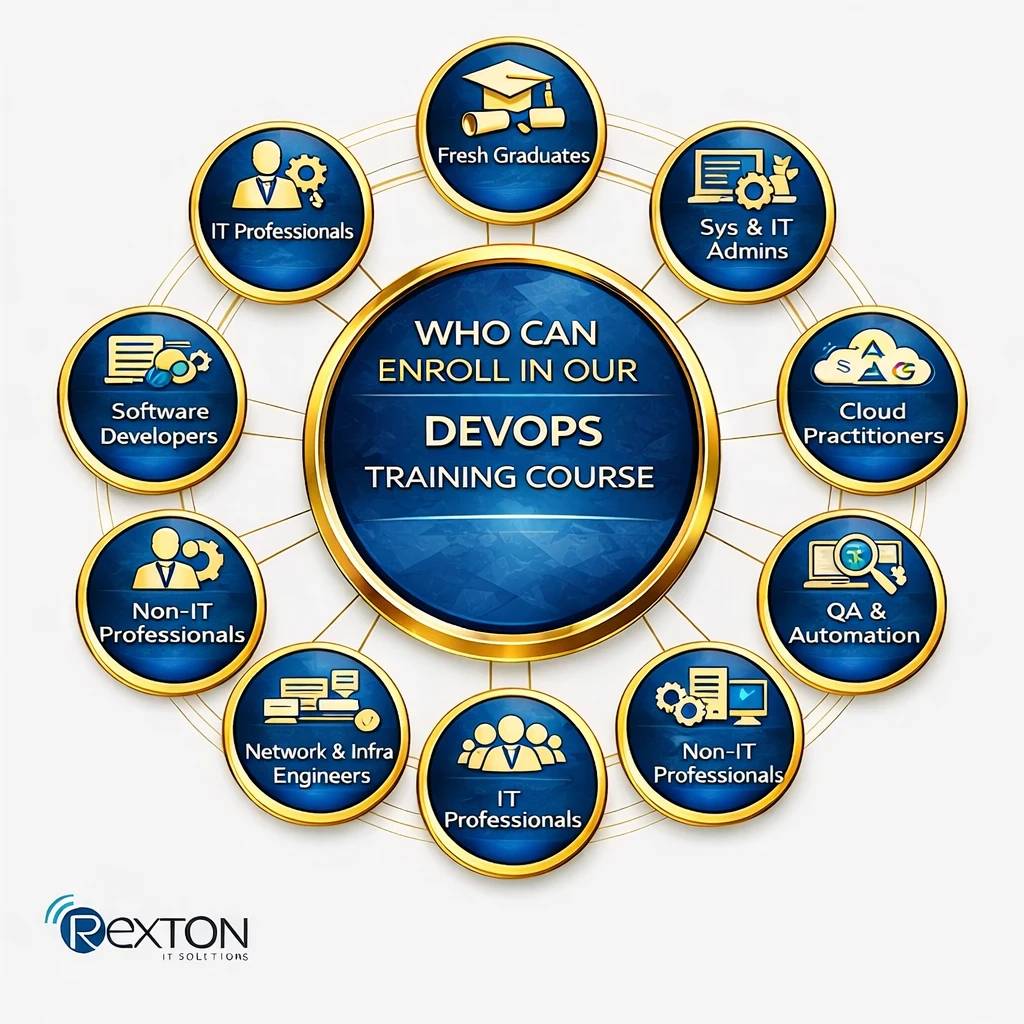
Who Can Enroll in our DevOps Training Course
- Fresh graduates from IT, computer science, or related fields
- Software developers and programmers
- System administrators and IT support engineers
- Cloud practitioners working with AWS, Azure, or Google Cloud
- QA engineers and automation testers
- Network and infrastructure engineers
- Professionals from non-IT backgrounds with basic technical aptitude
- IT professionals planning a career upgrade into high-demand roles
- Engineers working with containers, Kubernetes, and microservices
- Professionals responsible for application deployment and monitoring
- Anyone targeting DevOps certifications or cloud-native roles
Start to Success
Like the Career Path? Enquire Now
What Do You Need to Know Before Enrolling in the DevOps Course
- Basic IT knowledge – understanding of how applications and systems work
- Operating system fundamentals – hands-on familiarity with Linux commands and file systems
- Networking basics – TCP/IP, DNS, HTTP/HTTPS, and firewalls
- Programming or scripting awareness – basic knowledge of Python, Bash, or Shell scripting
- Version control basics – working knowledge of Git and repositories
- Cloud fundamentals – awareness of services from AWS, Azure, or Google Cloud
- Databases basics – understanding of SQL or NoSQL concepts
- Willingness to practice – ability to work with labs, tools, and real-world scenarios
| Exam Name | Exam Code | Fee |
|---|---|---|
| Certified Kubernetes Administrator | CKA | $395 |
| Certified Kubernetes Security Specialist | CKS | $395 |
- Module 1: Introduction to DevOps – What is DevOps?, DevOps Lifecycle and Principles, Benefits of DevOps, DevOps vs Traditional IT, Key DevOps Tools Overview, DevOps Roles and Responsibilities.
- Module 2: Version Control with Git & GitHub – Introduction to Version Control, Installing Git and Git Basics, Git Branching and Merging, Working with Remote Repositories, GitHub Basics, Git Workflow (Gitflow, Feature Branching).
- Module 3: Build Automation with Maven or Gradle – Introduction to Build Tools, Maven Project Structure, Maven Life Cycle and Plugins, Creating and Managing Builds, Gradle (Optional or alternative to Maven).
- Module 4: Continuous Integration with Jenkins – Introduction to Continuous Integration, Installing and Configuring Jenkins, Jenkins Jobs and Pipelines, Jenkins Plugins and Integration, Pipeline as Code (Jenkinsfile), Automating Builds and Tests.
- Module 5: Configuration Management with Ansible – Introduction to Configuration Management, Why Ansible? Advantages over Chef and Puppet, Ansible Architecture and Inventory, YAML & Playbooks, Modules, Roles, and Variables, and Ansible Tower.
- Module 6: Containerization with Docker – Introduction to Docker and Containers, Docker Architecture and Installation, Working with Docker Images and Containers, Dockerfile, Docker Compose, Docker Volumes and Networking, Docker Registry (Docker Hub).
- Module 7: Orchestration with Kubernetes – Introduction to Kubernetes, Kubernetes Architecture (Master, Node), Pods, ReplicaSets, Deployments, Services, ConfigMaps and Secrets, Helm Charts (Package Management), Hands-on with Minikube or Managed K8s (EKS/GKE/AKS).
- Module 8: Infrastructure as Code with Terraform – What is IaC and Why Terraform?, Terraform Architecture and Providers, Creating and Deploying Infrastructure, Variables, State Files, and Workspaces, Modules and Reusability, Provisioning on AWS/Azure/GCP.
- Module 9: Continuous Monitoring and Logging – Importance of Monitoring in DevOps, Introduction to Prometheus and Grafana, Setting Up Metrics and Dashboards, Logging with ELK Stack (Elasticsearch, Logstash, Kibana), Application Performance Monitoring (APM) Tools Overview (e.g., New Relic, Datadog).
- Module 10: Continuous Testing – DevOps Testing Strategy, Unit, Integration, Functional Testing, Automated Testing Tools: Selenium, JUnit, Integrating Tests into CI/CD Pipelines, Shift-Left Testing in DevOps.
- Module 11: DevSecOps Integrating Security – Introduction to DevSecOps, Security in DevOps Lifecycle, Static and Dynamic Code Analysis, Tools: SonarQube, Snyk, Trivy, Secrets Management (Vault, AWS Secrets Manager).
- Module 12: Cloud Platforms Overview (AWS/Azure/GCP) – Introduction to Cloud Computing, Comparing AWS, Azure, GCP, Hands-on with Basic Cloud Services:- Compute (EC2, VM), Storage (S3, Blob, GCS), Networking (VPC, Load Balancer), CI/CD Integration with Cloud.
- Module 13: Real-Time Projects and Capstone – Project 1: CI/CD Pipeline for a Web Application, Project 2: Deploy Microservices on Kubernetes, Project 3: Infrastructure Deployment using Terraform on AWS, Project 4: Monitoring and Logging Integration, Project 5: Security Scanning Integration.
- Module 14: Certification and Interview Preparation – Resume Building for DevOps Roles, Mock Interviews and Q&A, DevOps Certification Guidance (AWS, CKA, Docker, etc.).
Course Features
In this DevOps course, you will be provided with the following materials:
Book A Demo Class
Benefits of Our Comprehensive DevOps Training and Course

High-Paying Role after DevOps training
You can apply or prepare for the following career roles with the job-oriented Windows Server Training course by Rexton IT Solutions:
| Job Role | Role Overview | Estimated Salary (INR / Year) |
|---|---|---|
| Junior DevOps Engineer | Assists with CI/CD pipelines, basic automation, and cloud operations | ₹4,00,000 – ₹8,00,000 |
| DevOps Engineer | Manages deployments, automation, monitoring, and infrastructure | ₹6,00,000 – ₹15,00,000 |
| Senior DevOps Engineer | Designs scalable DevOps pipelines and cloud infrastructure | ₹12,00,000 – ₹25,00,000 |
| Lead DevOps Engineer | Leads DevOps teams and oversees platform architecture | ₹18,00,000 – ₹33,00,000+ |
| DevOps Architect | Designs enterprise-level DevOps and cloud strategies | ₹25,00,000 – ₹40,00,000+ |
| Cloud DevOps Engineer | Handles DevOps processes on AWS, Azure, or GCP | ₹8,00,000 – ₹20,00,000+ |
| Site Reliability Engineer (SRE) | Focuses on system reliability, performance, and automation | ₹15,00,000 – ₹35,00,000+ |
| Cloud System Administrator | Manages and maintains cloud infrastructure environments | ₹6,50,000 – ₹16,00,000 |
| Cloud Security / DevSecOps Engineer | Integrates security into DevOps pipelines and cloud platforms | ₹8,50,000 – ₹24,00,000 |
| Platform Engineer | Builds and maintains internal developer platforms | ₹10,00,000 – ₹28,00,000 |
The salaries mentioned above are rough estimates gathered from multiple job-listing websites. The actual figures may differ depending on the organization’s size and its pay scale.
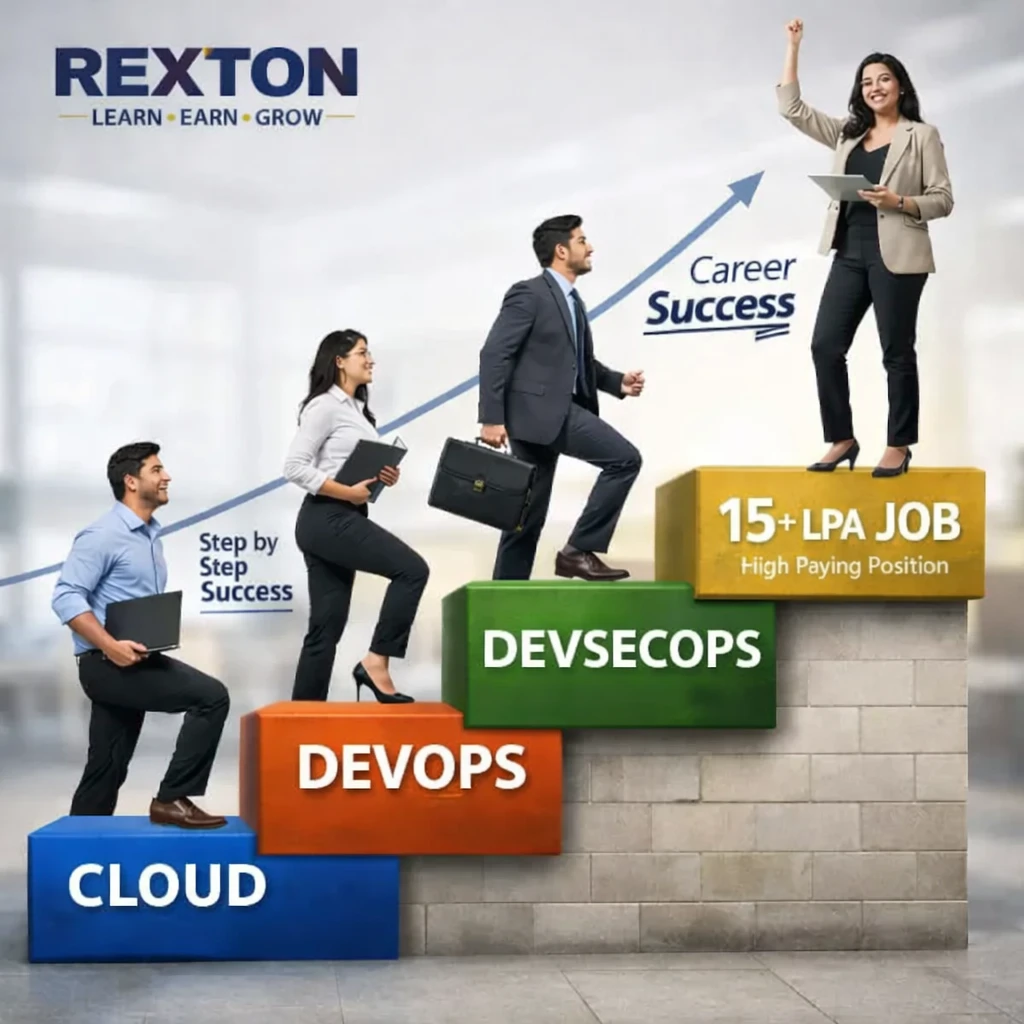
Our Recently Placed Students


Frequently Asked Questions
Yes, absolutely. Getting into DevOps is currently the hot topic in the IT industry and offers a promising career path. With this DevOps course, you will get multiple job opportunities with high pay and a significantly better career path.
Our DevOps course online is completely self-paced and has no time constraints. You can take the classes at any time and complete the course at your convenience.
Yes, there are no strict requirements or academic qualifications required to either enroll in our DevOps course or to choose DevOps as a career option.

